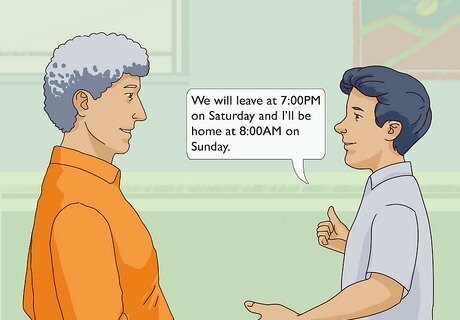
views
Earning Their Trust

Be responsible in your day-to-day life. Responsibility means doing the things that need to be done. It also means being honest and reliable. All of this plays into what parents will say when you ask them for a sleepover. If you want to be treated maturely, be mature. Don't expect this to work overnight, though. Just because you are mature for one whole day does not mean that your parents will let you go to a sleepover.

Plan your sleepovers wisely. Whether you have your parents' trust or not, permission often depends on the night you're planning the sleepover for. If you want to sleepover on a school night, parents are usually unlikely to give you permission. On the other hand, a night during summer vacation will stand a better chance. If you want to increase the chances of getting permission, you should plan to spend the night when there's nothing happening the next day. Sleepovers are generally harder to get permission for if they're co-ed. Moms and dads can be uncomfortable if boys and girls are sleeping over together, and may have firmer rules depending on their values. The size of the sleepover also matters. Some parents will be more comfortable with smaller sleepover than bigger ones.

Keep open communication with your parents. Earning your parent's trust is not something that happens overnight. It can also be difficult and slow to rebuild if it is broken. In order to have trust between parent and child, you should be talking to them every day. Let them know about everything that's happening in your life. It's good to make this a normal thing for your relationship with them. This will help a lot more than your chances for sleepovers. Trust goes both ways. If you want your parents to trust you, then you should give them a chance and trust them too. A good way to show your parents that you trust them is to listen to their advice.

Keep up with your homework and chores. In an adult's world, play needs to be balanced out with work. In your case, keeping up with homework and household chores will prove that you deserve to go out and let loose. If there's anything that needs to be done before you ask them make a point of doing it first. Don't let an unfinished chore be used against you when you ask to spend the night.
Convincing Your Parents

Make sure they're in a good mood first. As unfair as it may seem, part of what depends on whether your parents give permission is the mood you're in when they ask. If they're already upset about something before you approach, it's almost guaranteed that they will say no. This is because they do not want to deal with any added stress. One thing you might do is see what you can do to help your parents out before asking. That way, they'll be in a better mood, and you'll have proven yourself deserving in their eyes.

Pop the question. Asking your parents can be stressful depending on the kind of relationship you have with them, but it needs to be done calmly. Above all else, you need to say it in a way that isn't going to make it sound like a negative interaction. If you go into it with a pessimistic mindset, it's all the more likely your parents will deny you. It can be good to offer a few details before asking the question. This can help avoid a quick "no." Say something like this: "My friend is having her birthday tomorrow, and wanted to have a pizza sleepover to celebrate. Would it be okay if I went over there and spent the night tomorrow?" Sitting down next to them while you ask can be a helpful trick, as it will make them feel less rushed in their decision. If possible, it's a good idea to ask the question a couple of days in advance. Parents are usually more likely to react positively to a request in advance, rather than a last-minute plan.

Give them all the details. If parents are feeling nervous about letting their child out for the evening, giving them all the details will put them at ease. Giving them a run-down of the plans and things they may want to know will be a great help. Being honest and upfront about it will give you the highest chance of getting their permission. Here are some things you should tell them: Where you'll be staying. Whether you're planning on leaving your friend's house at some point in the evening. What kind of parental supervision is expected. This is a big one. Whether anyone else will be the home. That includes siblings of your friend or other relatives. What your friend's family situation is like.

Tell them sleepovers are healthy. Even if you're going to a sleepover for the sake of having fun, there are a lot of extra benefits to a kid sleeping over. Letting your parents know the benefits can ease them into thinking it's a good thing for your upbringing. Try bringing up some of these if they're having a hard time budging: Children at sleepovers learn new social skills. They have to be flexible in a new environment. You're going to get a fresh perspective of another family during a sleepover. Try not to make this one sound like you want to escape from your own family! A child being out of the house gives parents a chance to relax. Sleepovers can be an enjoyable treat once in a while. They can give you the opportunity to do interesting activities you haven't tried before, like a movie marathon or listening to a favorite band's complete set of music together.

Ask about their main reason for concern. If you run into trouble with convincing them, it can be helpful to turn the conversation with your parents into a search for a solution. Ask about the main issue that they're worried about, and ask what can be done to solve it. Keep your focus on finding a solution, rather than letting yourself get angry. Popping a question about this should be straightforward and calm. Say something like: "I understand that you may be worried over me going out tonight. What in particular is bothering you? Maybe we can find a way to fix it."

Leave contact info. Contact info is important, both for the child and the parents. Your parents will want to be able to get a hold of you no matter what. Even if they never call the number it will put them at ease to have a number they can call if they don't hear anything from you. This should be the home phone of the house you're staying at, or the cell number of your friend's parents. Don't give fake numbers. Even if you manage to make it out this time, messing around with your parents will ruin their trust and your chances for future sleepovers.

Suggest that the sleepover happen at your place. Parents can feel helpless if their child if sleeping somewhere else. If you replan the sleepover to happen at your place, you can stand a chance of making things work. That way, you'll have time with a friend, and your parents will still feel like they're in control. Some parents are automatically against any friends staying the night at their home, so don't take this as a surefire alternative plan.

Ask for a sleepover once you're over. It can be risky to ask for a sleepover once you're already there, but impromptu plans do happen. If you want a sneakier approach, you can ask to go over for dinner, as dinners are usually easier to get permission for. After dinner, you can get relaxed and call up your parents to ask. Sometimes, a parent will have an easier time giving permission for something that is already happening. If you choose this however, you should be prepared for disappointment. Some parents won't take kindly to you trying to pull a fast one under their noses. It's a good idea to pack your sleepover things just in case. In order for this to work out, your parents will probably have to know the family you're staying with well. It also helps if you have had successful sleepovers at that place before.

Make a set time for drop off and pickup. Parents like set plans. Give them a rough idea of when you'll be back. That way, they'll be able to relax for the time being. Set plans are a good thing, as they help to fight stress and worry. At the same time, you should be flexible with when they can pick you up. A lot of adults have a lot going on throughout their day, so it should be up to them when you are picked up the next day.
Staying the Night Responsibly

Stick with your plans. If you say you're going to do something and your parents agree with it, do your best to follow through. If you tell them you're going to do something and do something else, you risk ruining trust. If you can prove to your parents that you can follow through with your plans, they will start to see you are more responsible and start to trust you more.

Introduce your parents to your friend's parents. Part of your parents' decision depends on what they think of the friend you want to sleepover with. In most cases however, their ultimate concern is your safety. They want to make sure you'll be taken care of. That's where the friend's parents come in. If your parents can put a name to a face, it will set their minds at ease when you ask to sleepover.

Let your parents get to know your friend. If your parents don't already know your friend, it's a good idea to put a name to a face. By introducing them, your parents can see that your friend isn't near as bad as they may have feared. Even unruly friends tend to be well-behaved when other parents are around. Your parents will probably be trying to decide the sort of danger your friend may put you in. If your friend is known to be belligerent and irresponsible, you'll have a very hard time convincing them that it's a good idea to stay the night.

Call your parents if you want to be taken home. By taking a leave from your own home, you need to take responsibility for yourself. That includes knowing to leave if you don't want to stay anymore. Even if it's late, your parents will probably be happy that you decided to call rather than sit through something unpleasant. If anything, it will prove to them that you can be trusted to call out a bad situation when you see one. For example, if you feel sick or don't feel comfortable spending the night anymore for whatever reason, call up your parents.

Let your parents know how the sleepover went. Keeping your parents up to date with everything will make them feel more at ease. When you're either picked up or get home, talk to your parents a bit about how the sleepover was. What sort of stuff did you get up to? Was it fun? What was your friend's family like to be around? All of these can help show your parents that a sleepover is a healthy activity. Remember: You don't just want to make this sleepover work. You also want to ensure future sleepovers. Making it a pleasant experience for everyone involved will make sure you have the highest chance of more sleepovers.



















Comments
0 comment